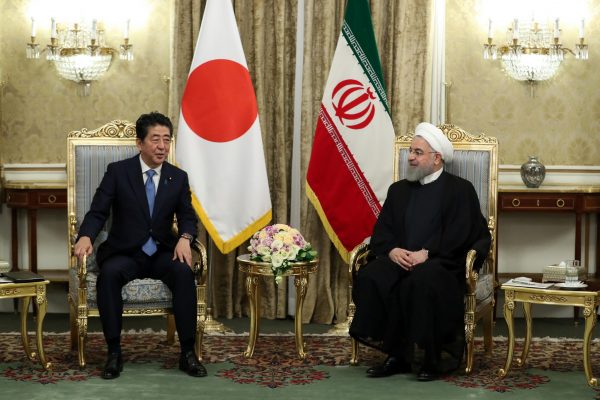In 2018, the US Trump administration announced plans to withdraw from the Joint Comprehensive Plan of Action (JCPOA) — commonly known as the Iran nuclear deal — and apply maximum pressure on Iran until it acquiesces to twelve demands. Iran rejected these demands, which include terminating ballistic missile development, accepting unrestricted inspections of nuclear-related and military facilities, and ceasing support for ‘terrorist organisations’.
Iran has so far not agreed to talks, adopting a policy of ‘strategic patience’ — abiding by the nuclear agreement and garnering favourable international public opinion while waiting for the Trump administration to leave office. Still, the US government’s two-stage resumption of economic sanctions on 7 August and 5 November 2018 dealt a heavy blow to the Iranian economy. Iran’s currency has fallen to less than one-third its previous value. The inflation rate has risen to about 40 per cent.
Impatient with an Iran that refuses to surrender, hard-liners in the US administration have ramped up the pressure since April. On 8 April, the Trump administration designated the Islamic Revolutionary Guard Corps (IRGC), an elite branch of the Iranian military, as a terrorist organisation — the first ever case of the United States assigning such a designation to regular military forces. The US Department of Defense and the CIA reportedly opposed the policy course for fear of attacks against US forces deployed throughout the Middle East. But Secretary of State Michael Pompeo and National Security Advisor John Bolton pushed it through.
In an effort to reduce Iran’s petroleum revenues, the United States on 22 April ended waivers that had let eight countries — Japan among them — buy Iranian crude oil without facing US sanctions. 5 May then saw a security team centred around Bolton dispatch the USS Abraham Lincoln carrier strike force and a bomber task force to the Persian Gulf, as well as Patriot missiles. Scepticism is high over the purported rationale for the military build-up: alleged collusion between Iran and al-Qaeda, as well as Israeli intelligence of apparently imminent attacks on US forces by Iran-backed militias.
There is now no one left within the Trump administration ready to block the anti-Iranian hard-liners and disputes in the Middle East are intensifying. Incidents that are too convenient to be mere coincidence continue to occur. For example, on 12 May, four ships, including two tankers from Saudi Arabia, were attacked off the coast of the UAE. US officials immediately denounced the attacks as the work of Iran. An assessment made by a Norwegian insurance company strongly suspected IRGC involvement.
Iranian President Hassan Rouhani on 8 May responded to US pressure by announcing that Iran would partially suspend its compliance with the JCPOA. If the other JCPOA signatories failed to fulfil their obligations with respect to financial transactions and crude oil trading within 60 days, Iran would begin phasing out its adherence to other obligations. Though Iran’s response can be seen as a restrained one, the United States levelled new sanctions targeting iron, aluminium and copper trading.
When it was reported on 13 May that the Pentagon — on orders from Bolton — had put together a plan to dispatch an additional 120,000 US troops, Trump publicly ruled out war, stating that he only wants to negotiate with Iran’s political leaders. Trump’s statement sparked speculation about a possible rupture between Bolton together with Pompeo — the most rigid hard-liners against Iran — and Trump. During a press conference at the start of the 27 May Japan–US summit, Trump expressed his hopes for Japanese mediation.
Meanwhile in Iran, Supreme Leader Ayatollah Ali Khamenei insisted that his country had no intention of going to war but would respond if attacked. To avoid an accidental clash in the Persian Gulf the Iranian government appears to be desperately seeking out a channel of dialogue through several routes — one of those being Japan. For his part, Trump could gratify his ego and those of his supporters by avoiding war and becoming the first US president since the Iranian Revolution to meet directly with an Iranian counterpart.
Japan presently enjoys good relations with both countries and could offer the most suitable setting for mediation. During the Japan–US summit, Japanese Prime Minister Shinzo Abe proposed mediating and was, in mid-June, the first Japanese prime minister in 40 years to visit Iran. On the same day as when Abe met Khamenei, a Japanese tanker was attacked in the Gulf of Oman. Although the United States quickly blamed Iran for attacks, Iran firmly denied it and Japan also refrained from making a quick conclusion.
The Japanese mediation attempt unfortunately faced harsh sabotage from groups who don’t want Iran and the United States to improve relations. But Japan should not give up its efforts. One possible approach would be to, at the 28–29 June Osaka G20 summit, discuss how to de-escalate the tensions in the Persian Gulf and to protect the safe oil supply route. Also, Abe could try to persuade Trump not to provoke Iran, if he really desires a direct negotiation with Iran. To encourage the United States and Iran to return to the peaceful track, Japan should cooperate with the JCPOA signatory countries and main importers of Iranian oil, such as India, Turkey and South Korea, as well as Iran’s neighbours. The US maximum pressure policy on Iran seems to be exacerbating the situation.
Given that Japan imports 90 per cent of its petroleum from the Middle East, this is an issue essential to both the peace and security of the Persian Gulf and the stability of the Japanese economy. By demonstrating a firm commitment to supporting the Iran nuclear deal and respecting the Nuclear Non-Proliferation Treaty regime, Japan will also send a clear message of opposition to North Korea’s development of nuclear weapons and ballistic missiles.
Dr Mari Nukii is Research Fellow at the Japan Institute of International Affairs (JIIA), Tokyo.
A version of this article was originally published here in JIIA’s Strategic Comments

